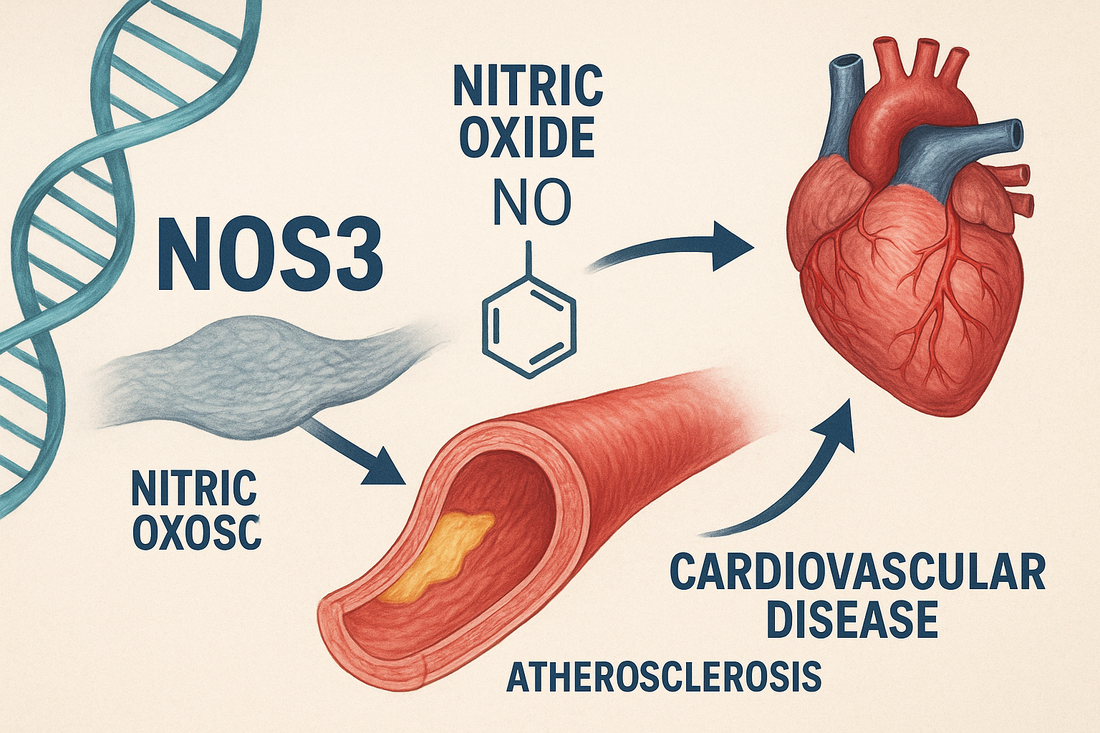NOS3 Gene Variants and Cardiovascular Risk
Introduction
The NOS3 gene, located on chromosome 7q36, encodes endothelial nitric oxide synthase (eNOS)—a critical enzyme for vascular health. eNOS generates nitric oxide (NO), a signaling molecule that relaxes blood vessels, lowers blood pressure, and protects against atherosclerosis.
Variants in NOS3 can reduce NO bioavailability, leading to endothelial dysfunction, hypertension, and increased cardiovascular disease (CVD) risk. CardiaX testing includes NOS3 polymorphisms because they provide valuable insights into personalized risk management.
NOS3 Function in the Body
-
Vasodilation: NO relaxes vascular smooth muscle, maintaining healthy blood pressure.
-
Anti-atherosclerotic effects: Inhibits platelet aggregation, leukocyte adhesion, and smooth muscle proliferation.
-
Endothelial health: NO reduces oxidative stress and inflammation in blood vessel walls.
-
Exercise response: Physical activity stimulates eNOS, boosting NO and cardiovascular resilience.
Key NOS3 Variants
rs1799983 (G894T, Glu298Asp)
-
T allele carriers: Reduced eNOS activity, lower NO levels, higher risk of hypertension and coronary artery disease.
rs2070744 (-786T>C promoter variant)
-
C allele carriers: Lower NOS3 transcription, less NO production, associated with hypertension, stroke, and endothelial dysfunction.
rs3918226 (-665C>T promoter variant)
-
T allele carriers: Impaired transcriptional regulation, linked with increased cardiovascular risk.
How NOS3 Variants Contribute to Cardiovascular Disease
-
Hypertension: Reduced NO impairs vasodilation, leading to higher systemic blood pressure.
-
Endothelial dysfunction: Increased oxidative stress and inflammation in the vascular lining.
-
Atherosclerosis: Reduced NO accelerates plaque development and arterial stiffening.
-
Thrombosis: Lower NO increases platelet aggregation, raising clot risk.
What Worsens Risk in NOS3 Variants?
-
Smoking: Generates oxidative stress, destroying NO.
-
High salt intake: Exacerbates hypertension in low-NO states.
-
Sedentary lifestyle: Lack of exercise reduces eNOS stimulation.
-
Low antioxidant intake: Leaves NO unprotected from oxidative destruction.
-
Diabetes & insulin resistance: Further impair NO production and endothelial function.
How to Mitigate NOS3-Associated Risk
1. Lifestyle Strategies
-
Exercise: Aerobic and resistance training stimulate eNOS and increase NO bioavailability.
-
Diet:
-
Emphasize leafy greens, beets, and pomegranate (nitrate-rich foods that boost NO).
-
Adopt a Mediterranean diet with polyphenols to improve endothelial health.
-
Reduce salt intake to support blood pressure regulation.
-
-
Avoid smoking & limit alcohol: To preserve endothelial NO signaling.
2. Nutraceuticals
-
L-arginine & L-citrulline: NO precursors that improve endothelial function.
-
Omega 1300 — Omega 1300: Improves vascular integrity and lowers inflammation.
-
CoQ10 Omega — CoQ10 Omega: Enhances mitochondrial efficiency and endothelial health.
-
Curcumin Complex — Curcumin Complex: Reduces oxidative stress that depletes NO.
-
Vitamin C & E: Antioxidants that protect NO from oxidative degradation.
-
Magnesium: Promotes vascular relaxation and lowers BP.
3. Peptides
-
BPC-157: Supports endothelial repair and vascular resilience.
-
MOTS-c: Improves mitochondrial function and enhances exercise benefits on NO.
-
KPV: Anti-inflammatory peptide that preserves endothelial function.
4. Medications
-
ACE inhibitors / ARBs: Improve endothelial NO signaling and lower BP.
-
Statins: Upregulate eNOS activity independent of cholesterol lowering.
-
Antiplatelets: Reduce clotting risk when NO is impaired.
-
PDE-5 inhibitors (e.g., sildenafil): Enhance NO-mediated vasodilation in select cases.
Case Example
A 52-year-old male with NOS3 rs1799983 TT genotype (Asp298 homozygous) presented with hypertension and early signs of endothelial dysfunction.
Plan:
-
Lifestyle: Mediterranean diet, increased physical activity, beetroot juice daily.
-
Supplements: Omega 1300, CoQ10 Omega, L-citrulline, Curcumin Complex.
-
Peptides: BPC-157 and MOTS-c prescribed.
-
Medications: Initiated ACE inhibitor for BP control.
Outcome: After 4 months, BP improved from 148/92 to 126/80, inflammatory markers decreased, and exercise tolerance increased.
The Bottom Line
The NOS3 gene plays a vital role in cardiovascular health through its regulation of nitric oxide production. Variants can impair NO availability, leading to hypertension, endothelial dysfunction, and elevated CVD risk.
With CardiaX results, clinicians can design targeted interventions involving lifestyle changes, nutraceuticals, peptides, and medications to restore NO balance and protect vascular health.
References
-
Hingorani AD, et al. Endothelial nitric oxide synthase polymorphisms and hypertension. Hypertension. 1999.
-
Casas JP, et al. Genetic variants of NOS3 and coronary heart disease. Circulation. 2004.
-
Tesauro M, et al. Endothelial dysfunction and the role of eNOS gene variants. Eur Heart J. 2000.
-
Vlachopoulos C, et al. Oxidative stress, nitric oxide, and endothelial function. Eur Heart J. 2015.
👉 Would you like me to generate the custom wide blog graphic for NOS3 now, showing DNA, nitric oxide production, and cardiovascular outcomes?


